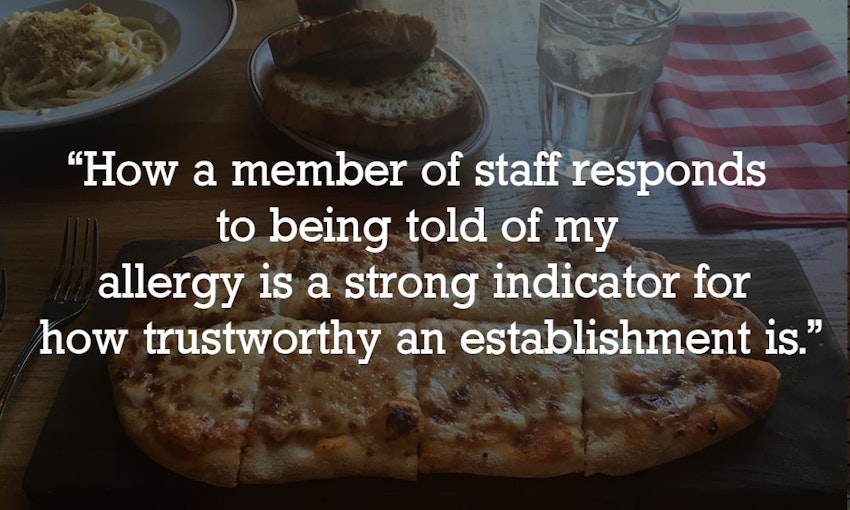Beth’s Allergy Blog Part 2: Eating Out

It’s December, the month to eat, drink and be merry, so we asked Beth to tell us what it’s like for someone with her condition to eat out…
Last month in my post I spoke about the basics of life with a food allergy. This time I’m going to expand on one of the scariest parts of that – eating in a restaurant.
Preparing to eat out
You have to trust the restaurant 100% whilst still having to be prepared for the worst to happen, so not only does eating out create a lot of anxiety, it requires a lot of preparation.
For instance, I always check the website of a restaurant before visiting – even if I have eaten there before. I look for any changes in their allergy policy, and see if they can cater for no risk of cross contamination, though sadly in my experience that is rare. I am highly unlikely to visit a restaurant if they don’t have a specific allergy menu that I can see for myself. Allergies need to be taken seriously and information needs to be provided clearly in order to promote a safe, trustworthy establishment. Often I will ring ahead and speak to a member of staff and ask how they deal with allergies. And if I am planning on visiting a new restaurant with friends, I will visit with my family beforehand if possible. I find it much easier to eat somewhere I have had a positive experience with previously.

Because although my own preparation helps, I would say that the experience provided by the restaurant is what makes me come away singing their praises, or vowing never to return again.
I am highly unlikely to visit a restaurant if they don’t have a specific allergy menu that I can see for myself.
Once I’m in the restaurant
The anxiety I face when eating somewhere new makes it an experience that is difficult to enjoy. As an allergy sufferer you have to trust that a restaurant has procedures in place to keep the information on their allergen menu current and accurate. Food items that are safe on one visit aren’t necessarily safe the next. I’ll look for the meal I feel is the safest option, and will often eat the same meal every time if I have had a positive experience previously.
I personally have to avoid even a trace of my particular allergen – eating any amount of it could prove fatal, so how a member of staff responds to being told of my allergy is a strong indicator for how trustworthy an establishment is. If they seem comfortable and confident with the information I am asking for, it makes for a more far more pleasant experience. I have had experiences of asking if they cater for allergies and simply been turned away and in quite a hostile, unprofessional manner. I also find it extremely uncomfortable if a member of staff struggles to articulate the allergy information. For an allergy sufferer to feel truly comfortable in a restaurant, allergy training should provide enough information to give a server confidence – or at the very least, a procedure should be in place for sufferers to speak to a manager.
I don’t think that you can call any restaurant ‘perfect’ unless they advertise themselves as 100% allergy friendly, which some bakeries do but not any restaurants that I know of. Also, a restaurant may provide a perfect experience once, twice or even a handful of times. That doesn’t mean it will happen every time.

The good, the bad and the ugly
Some restaurants I’ve been to once and never again. On one occasion I told the server about my allergies, had it confirmed that the food would be safe and that they don’t have any nuts in the kitchen. I then had one mouthful of food and immediately reacted. My symptoms appeared within seconds (swollen lips are always the first indicator) and I was just incredibly thankful to have someone with me who could advocate for me and make me feel as comfortable as I could in a terrifying situation. The manager responded by telling us that I should have already been informed of a cross contamination risk. But I was told nothing of the sort. A well-known, established restaurant put my life at risk. I was lucky this was just a mild reaction but experiences like that stay with you.
On the other hand, I’ve eaten at restaurants with amazing allergy policies. Clear information, plenty of options and my meal handled by the manager. Another well-established chain provided a wonderful experience for me, and it became somewhere I could enjoy and look forward to. I still felt like I had an allergy, but in a way that I was safe and understood. I do have to place the emphasis on the past tense, because I no longer eat at that particular restaurant – they became so strict with their allergy policy that I was limited to essentially nothing on the menu. I’ve read on Facebook forums how other people, some with small children who don’t understand the dangers like I do, have experienced this also.
A different restaurant also previously brilliant with my allergies, then changed their policy to include what is essentially a waiver. To make your order you have to go over to the computer and tick the box to say you accept that you are responsible if you have an allergic reaction in their restaurant. It creates a blanket ‘may contain’ warning for everything in the restaurant. It is incredibly disappointing to see this, and I would expect more with the rise in allergies, especially in larger chains who have the ability to cater for additional needs.
Some might find it strange that most of my positive experiences have been with local, independent restaurants. They care, they listen when I tell them about my allergy. They provide me with the information I need without making a fuss. I can eat and hardly think about my allergy. These restaurants give you an experience that is close to as home as you can get. I am loyal to these restaurants and I sing their praises whenever I can.
My list of bad experiences makes the positive ones really special.
In conclusion
My list of bad experiences makes the positive ones really special. They also prove that a good experience can be possible and should be possible. People with allergies want to go out with their friends and family. They should be able to look forward to trying a new restaurant. They should be able to ask about allergies in a bar and not receive a confused look as to why a cocktail would have peanuts in it! I’ll always be bothered that I can’t enjoy eating out and drinking the same way that ’normal’ people can. But I’m grateful to those places that do their best to help me try.”



